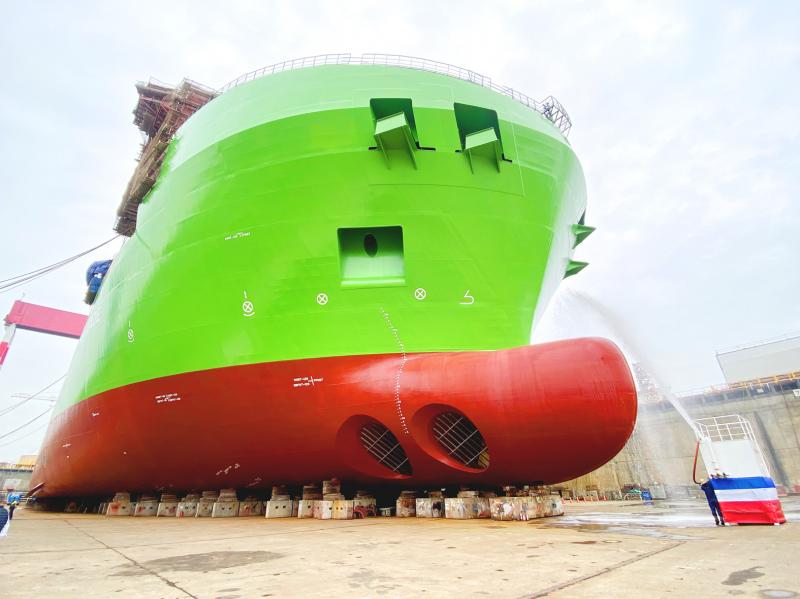Taiwan yesterday held a launching ceremony for its first domestically produced crane vessel, the Green Jade, to be used for offshore wind farm projects, with Premier Su Tseng-chang (蘇貞昌) saying it was a milestone in the nation’s push for green energy.
The 216.5m long ship is the second-largest of its kind in the world.
“The Green Jade provides the best tools and technologies for Taiwan to develop offshore wind power and promote energy transition,” Su said at the ceremony in Kaohsiung.

Photo: Hung Chen-hung, Taipei Times
The ceremony came as Taiwan on Wednesday unveiled a road map and strategies for achieving carbon neutrality by 2050.
“As 16 of the world’s 20 best wind farms are in Taiwan, and the government is ... determined to move toward net zero carbon emissions by 2050, better technologies and tools are needed to develop offshore wind power,” Su said.
“The vessel’s launch will help to further accelerate Taiwan’s energy transition,” he added.
The heavy-lift and installation vessel, built by CSBC Corp, Taiwan (台灣國際造船) at its shipyard in Kaohsiung, has a crane capacity of 4,000 tonnes. The Green Jade can accommodate a crew of up to 160 people.
It is a NT$7.5 billion (US$261.28 million) investment commissioned by CSBC-DEME Wind Engineering Co (CDWE, 台船環海) to transport wind turbines, jackets, components and structures in a single shipment. CDWE is a joint venture between CSBC and Belgium-based Dredging, Environmental and Marine Engineering NV.
CSBC chairman Cheng Wen-lung (鄭文隆) said at the ceremony that the Green Jade is the nation’s first crane vessel for offshore wind farms, and the second-largest in the world.
The company expects to deliver the vessel to CDWE in the spring of next year, Cheng said.
From next year to 2025, the vessel would be used for the nation’s two offshore wind farms — the Hai Long (海龍) 2 and 3 projects and the Chong Neng (中能) project, CDWE said.

Taiwan is projected to lose a working-age population of about 6.67 million people in two waves of retirement in the coming years, as the nation confronts accelerating demographic decline and a shortage of younger workers to take their place, the Ministry of the Interior said. Taiwan experienced its largest baby boom between 1958 and 1966, when the population grew by 3.78 million, followed by a second surge of 2.89 million between 1976 and 1982, ministry data showed. In 2023, the first of those baby boom generations — those born in the late 1950s and early 1960s — began to enter retirement, triggering

ECONOMIC BOOST: Should the more than 23 million people eligible for the NT$10,000 handouts spend them the same way as in 2023, GDP could rise 0.5 percent, an official said Universal cash handouts of NT$10,000 (US$330) are to be disbursed late next month at the earliest — including to permanent residents and foreign residents married to Taiwanese — pending legislative approval, the Ministry of Finance said yesterday. The Executive Yuan yesterday approved the Special Act for Strengthening Economic, Social and National Security Resilience in Response to International Circumstances (因應國際情勢強化經濟社會及民生國安韌性特別條例). The NT$550 billion special budget includes NT$236 billion for the cash handouts, plus an additional NT$20 billion set aside as reserve funds, expected to be used to support industries. Handouts might begin one month after the bill is promulgated and would be completed within

The National Development Council (NDC) yesterday unveiled details of new regulations that ease restrictions on foreigners working or living in Taiwan, as part of a bid to attract skilled workers from abroad. The regulations, which could go into effect in the first quarter of next year, stem from amendments to the Act for the Recruitment and Employment of Foreign Professionals (外國專業人才延攬及僱用法) passed by lawmakers on Aug. 29. Students categorized as “overseas compatriots” would be allowed to stay and work in Taiwan in the two years after their graduation without obtaining additional permits, doing away with the evaluation process that is currently required,

IMPORTANT BACKER: China seeks to expel US influence from the Indo-Pacific region and supplant Washington as the global leader, MAC Minister Chiu Chui-cheng said China is preparing for war to seize Taiwan, Mainland Affairs Council (MAC) Minister Chiu Chui-cheng (邱垂正) said in Washington on Friday, warning that Taiwan’s fall would trigger a regional “domino effect” endangering US security. In a speech titled “Maintaining the Peaceful and Stable Status Quo Across the Taiwan Strait is in Line with the Shared Interests of Taiwan and the United States,” Chiu said Taiwan’s strategic importance is “closely tied” to US interests. Geopolitically, Taiwan sits in a “core position” in the first island chain — an arc stretching from Japan, through Taiwan and the Philippines, to Borneo, which is shared by